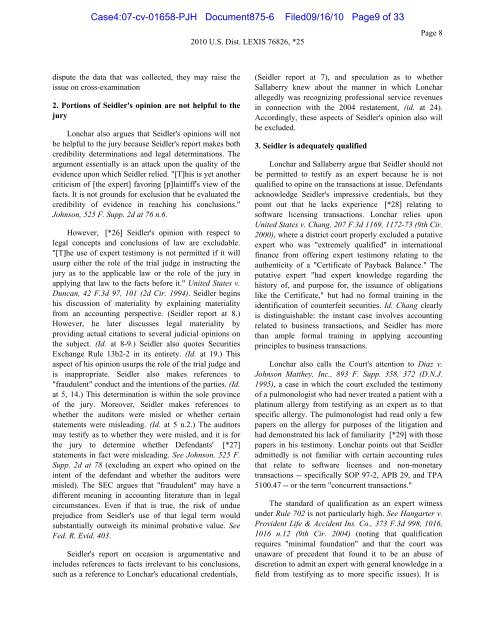exhibit 2 - SAP Lawsuit Portal
exhibit 2 - SAP Lawsuit Portal
exhibit 2 - SAP Lawsuit Portal
Create successful ePaper yourself
Turn your PDF publications into a flip-book with our unique Google optimized e-Paper software.
Case4:07-cv-01658-PJH Document875-6 Filed09/16/10 Page9 of 33<br />
dispute the data that was collected, they may raise the<br />
issue on cross-examination<br />
2. Portions of Seidler's opinion are not helpful to the<br />
jury<br />
Lonchar also argues that Seidler's opinions will not<br />
be helpful to the jury because Seidler's report makes both<br />
credibility determinations and legal determinations. The<br />
argument essentially is an attack upon the quality of the<br />
evidence upon which Seidler relied. "[T]his is yet another<br />
criticism of [the expert] favoring [p]laintiff's view of the<br />
facts. It is not grounds for exclusion that he evaluated the<br />
credibility of evidence in reaching his conclusions."<br />
Johnson, 525 F. Supp. 2d at 76 n.6.<br />
However, [*26] Seidler's opinion with respect to<br />
legal concepts and conclusions of law are excludable.<br />
"[T]he use of expert testimony is not permitted if it will<br />
usurp either the role of the trial judge in instructing the<br />
jury as to the applicable law or the role of the jury in<br />
applying that law to the facts before it." United States v.<br />
Duncan, 42 F.3d 97, 101 (2d Cir. 1994). Seidler begins<br />
his discussion of materiality by explaining materiality<br />
from an accounting perspective. (Seidler report at 8.)<br />
However, he later discusses legal materiality by<br />
providing actual citations to several judicial opinions on<br />
the subject. (Id. at 8-9.) Seidler also quotes Securities<br />
Exchange Rule 13b2-2 in its entirety. (Id. at 19.) This<br />
aspect of his opinion usurps the role of the trial judge and<br />
is inappropriate. Seidler also makes references to<br />
"fraudulent" conduct and the intentions of the parties. (Id.<br />
at 5, 14.) This determination is within the sole province<br />
of the jury. Moreover, Seidler makes references to<br />
whether the auditors were misled or whether certain<br />
statements were misleading. (Id. at 5 n.2.) The auditors<br />
may testify as to whether they were misled, and it is for<br />
the jury to determine whether Defendants' [*27]<br />
statements in fact were misleading. See Johnson, 525 F.<br />
Supp. 2d at 78 (excluding an expert who opined on the<br />
intent of the defendant and whether the auditors were<br />
misled). The SEC argues that "fraudulent" may have a<br />
different meaning in accounting literature than in legal<br />
circumstances. Even if that is true, the risk of undue<br />
prejudice from Seidler's use of that legal term would<br />
substantially outweigh its minimal probative value. See<br />
Fed. R. Evid. 403.<br />
Seidler's report on occasion is argumentative and<br />
includes references to facts irrelevant to his conclusions,<br />
such as a reference to Lonchar's educational credentials,<br />
2010 U.S. Dist. LEXIS 76826, *25<br />
(Seidler report at 7), and speculation as to whether<br />
Sallaberry knew about the manner in which Lonchar<br />
allegedly was recognizing professional service revenues<br />
in connection with the 2004 restatement, (id. at 24).<br />
Accordingly, these aspects of Seidler's opinion also will<br />
be excluded.<br />
3. Seidler is adequately qualified<br />
Page 8<br />
Lonchar and Sallaberry argue that Seidler should not<br />
be permitted to testify as an expert because he is not<br />
qualified to opine on the transactions at issue. Defendants<br />
acknowledge Seidler's impressive credentials, but they<br />
point out that he lacks experience [*28] relating to<br />
software licensing transactions. Lonchar relies upon<br />
United States v. Chang, 207 F.3d 1169, 1172-73 (9th Cir.<br />
2000), where a district court properly excluded a putative<br />
expert who was "extremely qualified" in international<br />
finance from offering expert testimony relating to the<br />
authenticity of a "Certificate of Payback Balance." The<br />
putative expert "had expert knowledge regarding the<br />
history of, and purpose for, the issuance of obligations<br />
like the Certificate," but had no formal training in the<br />
identification of counterfeit securities. Id. Chang clearly<br />
is distinguishable: the instant case involves accounting<br />
related to business transactions, and Seidler has more<br />
than ample formal training in applying accounting<br />
principles to business transactions.<br />
Lonchar also calls the Court's attention to Diaz v.<br />
Johnson Matthey, Inc., 893 F. Supp. 358, 372 (D.N.J.<br />
1995), a case in which the court excluded the testimony<br />
of a pulmonologist who had never treated a patient with a<br />
platinum allergy from testifying as an expert as to that<br />
specific allergy. The pulmonologist had read only a few<br />
papers on the allergy for purposes of the litigation and<br />
had demonstrated his lack of familiarity [*29] with those<br />
papers in his testimony. Lonchar points out that Seidler<br />
admittedly is not familiar with certain accounting rules<br />
that relate to software licenses and non-monetary<br />
transactions -- specifically SOP 97-2, APB 29, and TPA<br />
5100.47 -- or the term "concurrent transactions."<br />
The standard of qualification as an expert witness<br />
under Rule 702 is not particularly high. See Hangarter v.<br />
Provident Life & Accident Ins. Co., 373 F.3d 998, 1016,<br />
1016 n.12 (9th Cir. 2004) (noting that qualification<br />
requires "minimal foundation" and that the court was<br />
unaware of precedent that found it to be an abuse of<br />
discretion to admit an expert with general knowledge in a<br />
field from testifying as to more specific issues). It is


